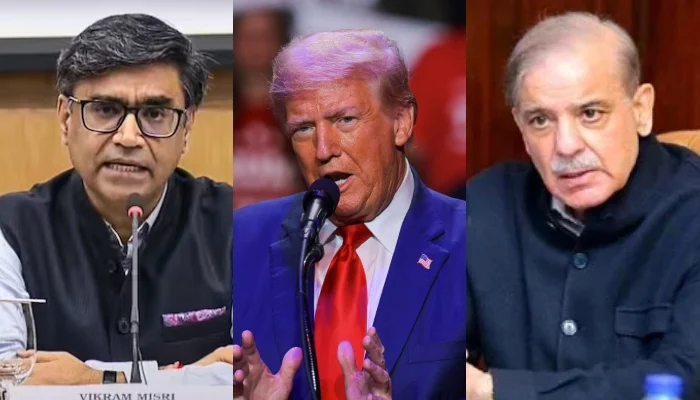India has dismissed assertions that the United States played any part in facilitating the recent ceasefire with Pakistan, maintaining that the cessation of hostilities was purely “bilateral.” Conversely, Islamabad has repeatedly expressed gratitude to American President Donald Trump for his perceived role in ending the cross-border conflict.
The ceasefire was implemented on May 11, following several hours of intense exchanges of fire along the Line of Control (LoC), which delineates Azad Jammu and Kashmir from Indian Illegally Occupied Jammu and Kashmir.
Both nations had been engaged in heightened military confrontation subsequent to India’s strikes into Pakistan, which were framed as a response to the Pahalgam incident of the previous month. The escalating cross-border tensions had raised fears of a nuclear conflict.
Speaking during a visit to Karachi on Monday, Pakistan’s Prime Minister Shehbaz Sharif affirmed that the US played a significant role in securing the agreement.
“Trump is a man of peace. I believe his team engaged with this situation wholeheartedly and played a vital role in securing the ceasefire,” Sharif stated, referring to President Trump.
President Trump had previously informed reporters in Washington: “We stopped a nuclear conflict. I think it could have been a bad nuclear war, millions of people could have been killed. So I’m very proud of that.”
India, however, has refuted these claims. Foreign Secretary Vikram Misri informed a parliamentary panel in New Delhi on Monday that the ceasefire was a bilateral decision between India and Pakistan, with no involvement from any third party. He added that there was no “nuclear signalling” from Pakistan and that India had acted in accordance with its own national interests.
Members of the committee questioned why India had not addressed Trump’s repeated assertions. One Member of Parliament inquired why India had allowed the US to “seize the narrative,” particularly given Trump’s multiple remarks regarding Kashmir.
The foreign secretary declined to comment on the number of Indian aircraft lost during the clashes, citing national security concerns.
India launched unprovoked missile attacks on several Pakistani cities during the night of May 6 and 7, which New Delhi claimed were directed at “terrorist targets” in response to last month’s Pahalgam attack in IIOJK, which resulted in the deaths of 26 tourists.
In response, the Pakistan armed forces initiated a large-scale retaliatory military operation, named “Operation Bunyan-um-Marsoos.” This operation targeted several Indian military strikes across multiple regions in retaliation for Indian attacks that reportedly killed a number of civilians in addition to army personnel.
These strikes, described by officials as “precise and proportionate,” were conducted in response to India’s continued aggression across the Line of Control (LoC) and violations of Pakistan’s sovereignty.
Pakistan’s response galvanized global powers, ultimately leading to the ceasefire.



